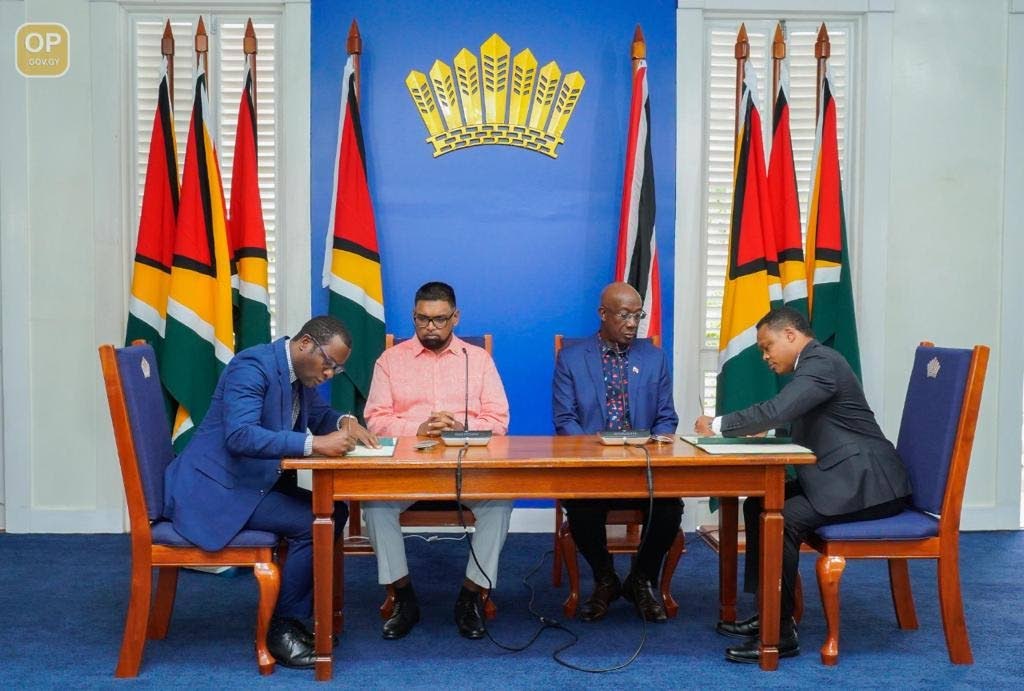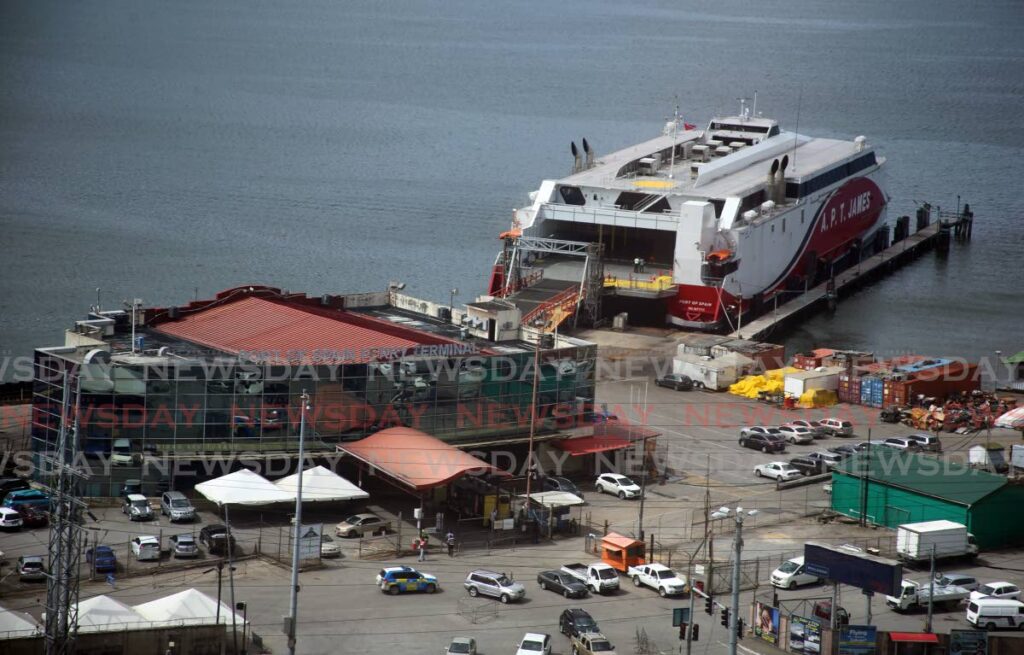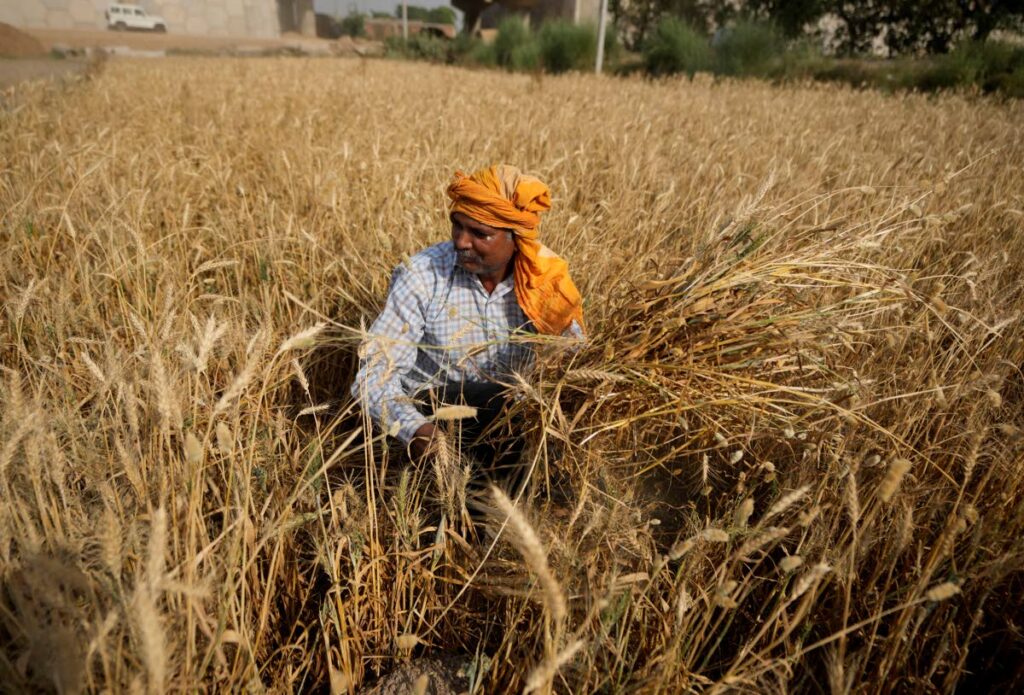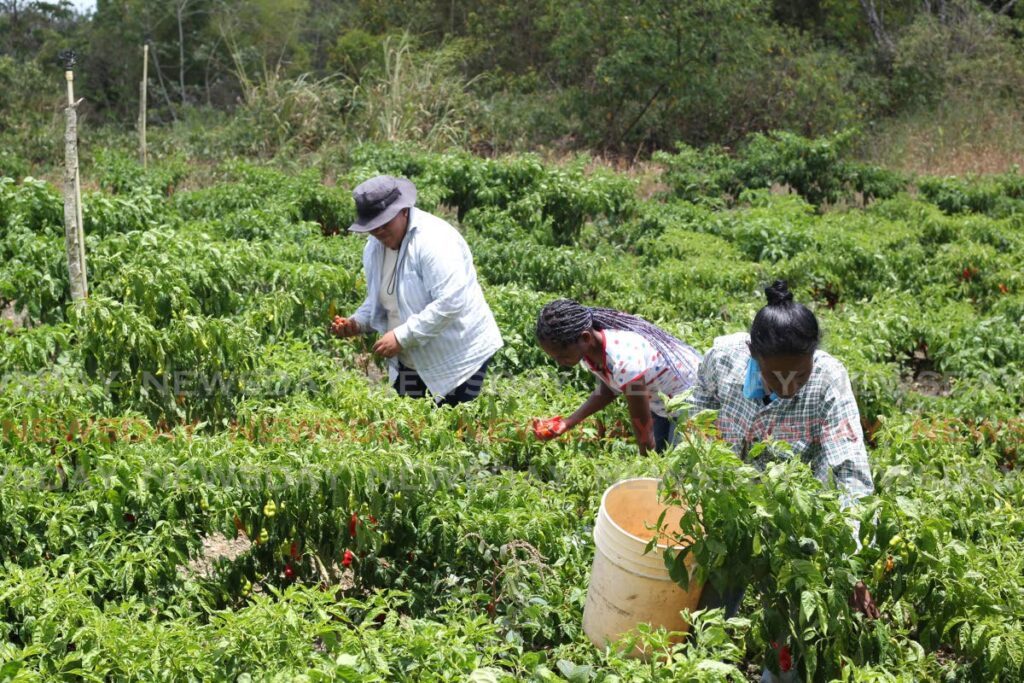Trinidad and Tobago, Guyana can help each other grow

The May 22 memorandum of understanding (MOU) signed between Trinidad and Tobago and Guyana comes at an opportune time for this country. This was the view expressed by the University of the West Indies (UWI) economist Dr Vaalmikki Arjoon in an interview on Tuesday.
The MOU was signed after a three-day Agri Investment Forum in Guyana from May 19-21. The agreement seeks to address partnerships in areas of trade and investment including non-tariff barriers, agriculture and food security, energy, infrastructure, security, education, tourism, sports and culture; with the aim of developing strategic co-operations and partnerships for both countries.
Oversight of the execution of the MOU would be under a new bilateral commission comprising both the private and public sectors.
The Prime Minister said the agreement showed that Caricom could seek and find solutions to its many problems, especially in agriculture, which was left vulnerable during the pandemic.
“In this covid19 period we found ourselves being denied access to our normal food supplies, which comes to us from Australia, New Zealand, Ukraine, Russia and the US. Our supply models are that we get our food from other people’s efforts in faraway lands.
“During the height of the covid19 period, at the extent of our vulnerability...even when we had money in hand, we could not buy food.
"That situation is not going to change, it is going to get worse. Now is the time to do what has to be done,” he said.
Rowley called on the private sector to refocus its investments in the areas of food supply, production, transportation, processing and distribution.
He added that Caricom urgently needed to make shifts in its investment patterns, partner with technical expertise and become insulated from external pressures.
“We have to look at what Caricom can and must do within Caricom to disentangle ourselves from the tenuous world food supply, that will get more troublesome, and put our shoulder to the wheel within Caricom to our own production systems, changing our supply and business models to put ourselves in supply situations that will not be impeded, destroyed or obstructed by other people elsewhere in the world,” he explained.
Guyana President Dr Mohamed Irfaan Ali, who holds the agriculture portfolio in the Caricom Quasi Cabinet, agreed that an important aspect of the MOU was private-sector involvement and felt the discussions with TT will be positive.
“We want the private sector of both countries to be fully on board, we want the investors of both countries to be fully on board, but, importantly, we want the people of both countries to be on board.” He said Guyana was well aware of the challenges that lie ahead, but was determined not to miss any opportunities for its growth and development.
There has been concern from the Georgetown Chamber of Commerce and Industry, which publicly said Guyana should not sign any MOU with TT, citing issues over non-tariff barriers.

Ali said Guyana saw the MOU as a commitment to secure the futures of both countries and it was being carried out at a political level to ensure the policies and contents were achieved within a reasonable time frame.
“It gave us an opportunity to not only examine a sector, but it gave us an opportunity to take the bull by horn and to identify, in a very open and frank way, missed opportunities to help identify opportunities in the future and blocks to those opportunities.
“We are not naive. We are not unaware of impediments or blocks or constraints or challenges. At the end of the day, we are not only neighbours, we are not only part of a community, we are also part of a family.”
He added that transport between the two countries was critical and an experimental ferry system to transport people and goods was being explored by the two governments.
Arjoon said, "The timing of the MOU between both governments couldn’t be better, especially given the global economic challenges imposed by the pandemic and the Russia/Ukraine conflict."
In particular, he cited the supply-chain constraints, and the greater need for food security, given the reduced supply and high price of food internationally.
"Indeed, it presents further opportunities for greater economic convergence, private-sector investment and overall trade linkages between both economies."
Arjoon hoped that TT and Guyana will "take advantage of the MOU without delay to capitalise on the economic benefits which it can foster."
Those benefits would primarily be increased investments by TT's private sector into Guyana and vice versa. Arjoon said other benefits included job opportunities in both countries and economies of scale stemming from these investments.
"Indeed, Guyana’s economic performance has (been) bolstered in the last few years by the mining and exports of bauxite, gold, diamonds and most importantly petroleum."
At the end of 2020, Guyana had a nominal Gross Domestic Product (GDP) of over US$5.7 billion, economic growth of 43 per cent and foreign direct investment (FDI) inflows of US$1.83 billion.
Arjoon said, "This presents an attractive investment environment for the TT private sector, notwithstanding some ease of doing business/bureaucracy issues and energy costs."
The MOU also provides an opportunity for TT to help Guyana's efforts to reduce the regional food import bill.
"Going forward and capitalising on the MOU, more of our local farmers should be encouraged to invest in Guyana and acquire arable land."
This land could be used for producing crops that require large acreages, such as corn, citrus, bananas, and animal farming.
Arjoon said, "Both administrations can explore the possibility of providing preference and concessions to TT farmers in acquiring lands for farming purposes and moving of agricultural equipment across to Guyana."
The Agriculture Ministry can also consider extending its grants and benefits to local farmers setting up operations in Guyana.
"Some of these farmers would need the capital assistance to be able to afford setting up infrastructure and access drainage etc." Arjoon observed, "Such an investment can certainly bolster agricultural output at a lower cost per unit, allowing our local farmers operating in Guyana to have more for export and, of course, supply to the local market."
Another key benefit of the MOU is greater food security, reduced price volatility and reduced risks to food supplies from geopolitical risks. The proximity of the two countries, together with a cultural bond, provides a strong platform for this initiative.
Arjoon also noted that Guyana is exploring a wheat-farming initiative. TT could benefit from co-operating in such an initiative.

"The Russia/Ukraine conflict has sent the wheat supply into a tailspin, causing the price of wheat to increase by over 60 per cent since February 16. "
He added that TT currently imports wheat from the US.
"If our local farmers can invest in and partner with Guyana’s economy to grow their own wheat, then they, in turn, can not only supply to our local economy, but also become exporters of wheat.
"We would also be guaranteed a supply at a lower cost, especially the since the cost of production and shipping costs to TT would be lower."
Another advantage to be gained from the MOU can be found through shipping and logistics. Arjoon said the Port of Spain port can be used by Guyana's private sector, especially manufacturers, as a transshipment hub. Raw materials and equipment imported by Guyana could be delivered to Port of Spain and then transported to Guyana on smaller vessels.
Arjoon added, "Guyana is also regarded as Brazil’s gateway to the Caribbean. Exports from Brazil to the region via Guyana can go through our port as a transshipment venue."
On Monday, Trade and Industry Minister Paula Gopee-Scoon welcomed the signing of the MOU.
“Guyana has a vast land mass and therefore countries like Guyana and Belize can produce these items (wheat). Once we get the production of these basic items going, there will be no concerns over availability. Then of course the price could be settled within the region.
“If we get into growing soya bean, then that means that you are going to be able to supply soya bean oil. After that there will be the mash, which is an input in the production of animal feed.
"All round it is going to benefit. These are the kind of sustainable initiatives...”
But she said outside of these, there is very little that can be done on a policy level to control the prices or offset any price increases.
“We have already taken off VAT and suspended the common external tariff. We are having discussions with NFM (National Flour Mills) and we are concerned about the pricing, but it is the consumer that we are most concerned about. What we are looking at it actual production. That is where we will be able to have more control over price and availability.”
The TTMA also welcomed the MOU.
TTMA president Tricia Coosal said, "The MOU will serve as a catalyst for the promotion of free trade within Caricom, while at the same time promote the deepening of the CSME (Caribbean Single Market and Economy) process, allowing the tenets of true integration among a group of countries to be solidified, as was envisioned by the framers of the CSME process."
She added the MOU was also important in the context of resolving trade barriers between TT and Guyana, which are known to curtail the development and progress of countries.
"As an organisation, TTMA shares an amicable working relationship with our counterpart, the Guyana Manufacturing and Services Association (GMSA). In fact, the TTMA is in the process of finalising our own MOU with the GMSA, which will seek the mutual benefit of the manufacturing sectors of both countries as it relates to trade."
In 2013, TT and Guyana signed an MOU which would have allowed TT farmers to use 10,000 acres of land in Guyana for agriculture. No agreement was ever reached on the locations. In 2018, then agriculture minister Clarence Rambharat said there had been discussions about using land in Guyana for cultivating animal feed.

“It was something that was discussed a long time, but of course, it was challenged by the fact that the people who consume the most amount of feed in Trinidad and in Guyana have long term supply contracts out of the US."
Rambharat said TT will have to explore how competitive it can be in providing animal feed and competing with extra-regional suppliers.

Comments
"Trinidad and Tobago, Guyana can help each other grow"